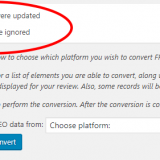5 reasons to still use Search Engine Friendly (SEF) URLs
I often get questions about search engine friendly URLs, or SEF url:s as some call them. Does it matter for SEO if the URL is “human readable” or not, if it contains the keywords or not?

Some claim that it no longer matters if the web address (URL) looks like this:
http://www.greatnewssite.net/content.php?s=71
or like this:
http://www.greatnewssite.net/sports/fotball.php
Some have heard it from their web hosting provider who can’t handle rewrites. Others heard it from Google, who 2008 declared that the use of, what we hereafter refer to as Search Engine Friendly URL:s, does not in itself give a higher ranking in the search results.
Sure it matters! But not as the term SEF suggests.
I was not at all surprised when Google dropped the SEF bomb Dynamic URLs vs. static URLs. I have always maintained that common sense should guide SEO practice. Google’s business concept is to deliver the most relevant search result, and why then would it matter what address the data is stored at? I never believed that putting keywords in the URL alone would make any difference to the search result. But it sure has significance – in other ways.
Here are five reasons to use SEF URLs:
1. When someone throws a link in a forum
When someone likes the content on http://www.greatnewssite.net/sports/fotball.php and recommend it to others by throwing a link on a forum simply by pasting the URL, the forum will automatically convert it into a link with the URL content as the link’s anchor text. If you use SEF URL:s with keywords, that link will help your Google ranking for that keyword.
2. The keyword may be highlighted in the search results
If the keyword is in the URL, it will appear in bold in the SERP, which increases the click through rate.
3. Canonicalization and “duplicate content”
Most websites are produced with a CMS, and it is quite common that CMS:es generate different URLs to the same content depending on where on the site the link appears. This is not good from an SEO perspective. Some would scare you with the “duplicate content” argument, but then again I say: use common sense. My thesis says that Google wants to present relevant content even if it is produced by a publishing tool that has some problems with URL canonization. Duplicate content is not the issue here. However, url canonization is unquestionable vital from another perspective: You do not want to spread the link juice across different URLs with the same content. So when you choose CMS (and web hosting), ensure that all URLs will be canonical, either out-of-the-box or by the help of a rewrite extension.
4. SEF URL:s makes it much easier to change CMS in the future
Using dynamic URLs makes it impossible, or at least extremely time consuming, to keep your search engine rankings for individual web pages on a large site if you would switch to another CMS in the future. You would need to create 301-redirects for each individual URL for your website to the corresponding URL generated by the new CMS. If you use SEF URLs, it is just a matter of making the same settings for SEF url generation on the new CMS. I recently migrated a website from Joomla to WordPress. Since I had implemented search engine friendly urls on the Joomla site, it was not a big problem to use the same urls after I had migrated it to WordPress.
5. SEF is user friendly
Some countries have laws ruling that public authorities must use “human readable” URLs on their websites to make them more user-friendly. Many users navigate “upward” a site structure by removing everything after the /category / in the address bar. Whatever makes the user happy – let them have it!
The term Search Engine Friendly URL is therefore somewhat obsolete. The purpose with SEF is not to be friendly to search engines. We should rather call them user-friendly URLs, simply friendly URLs, or semantic URLs. However, established terms tend to remain, so hey, let’s use SEF URLs!
What is your take? Looking forward to your comment!
Update: One more good reason, but not directly related to SEO, is that so called SEF urls is good for the security of your website. Read why at Joomla Security.









